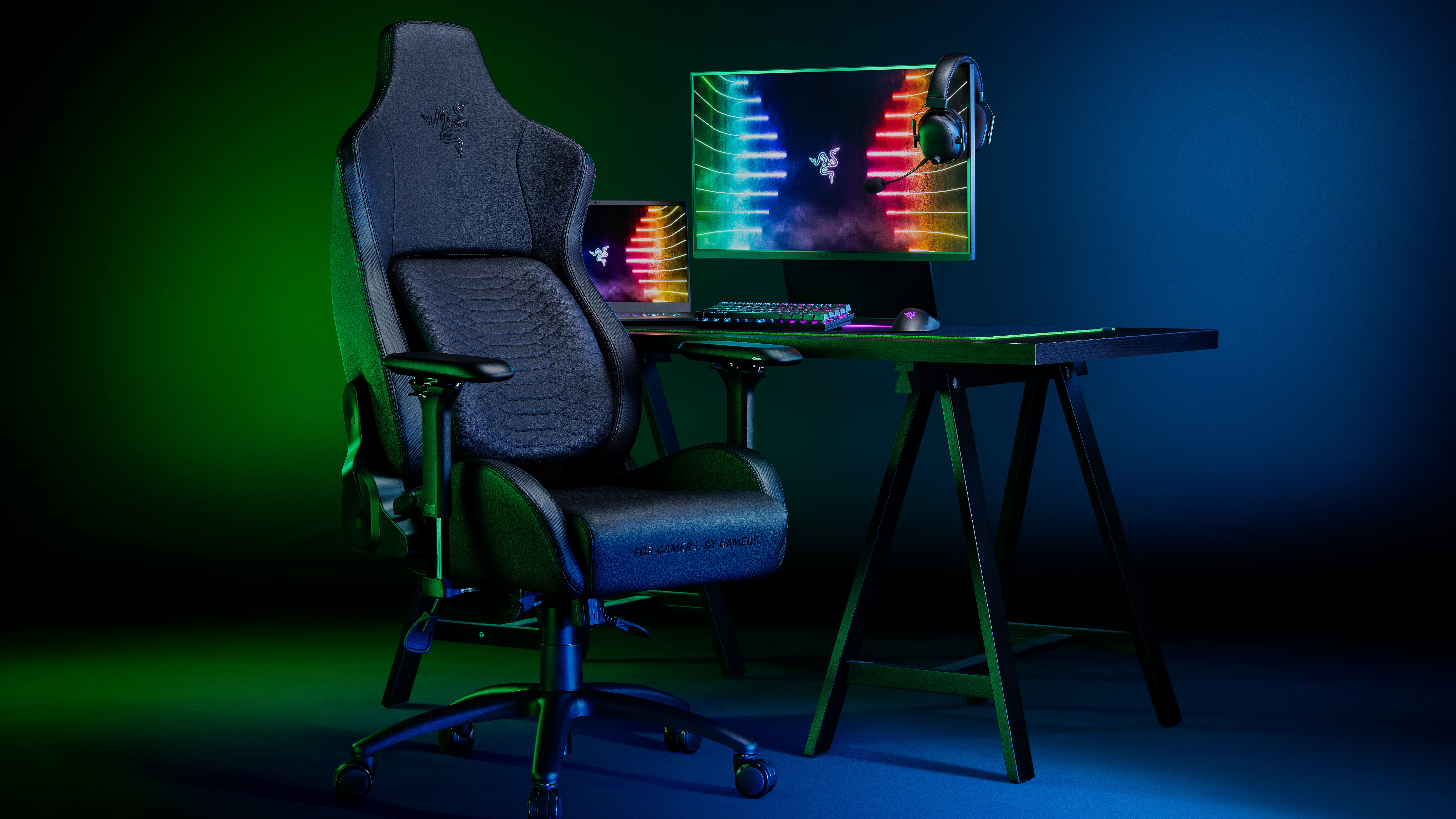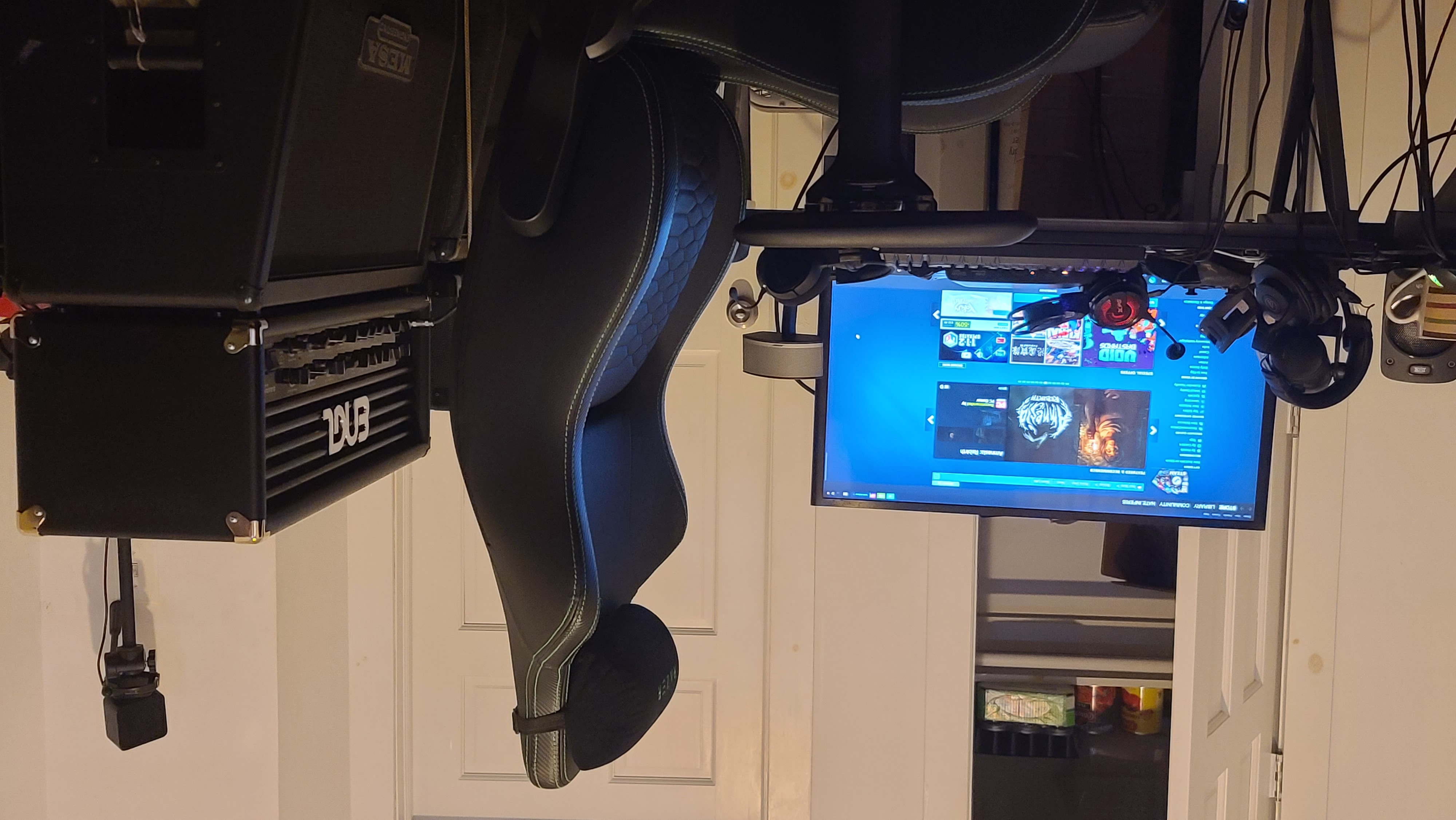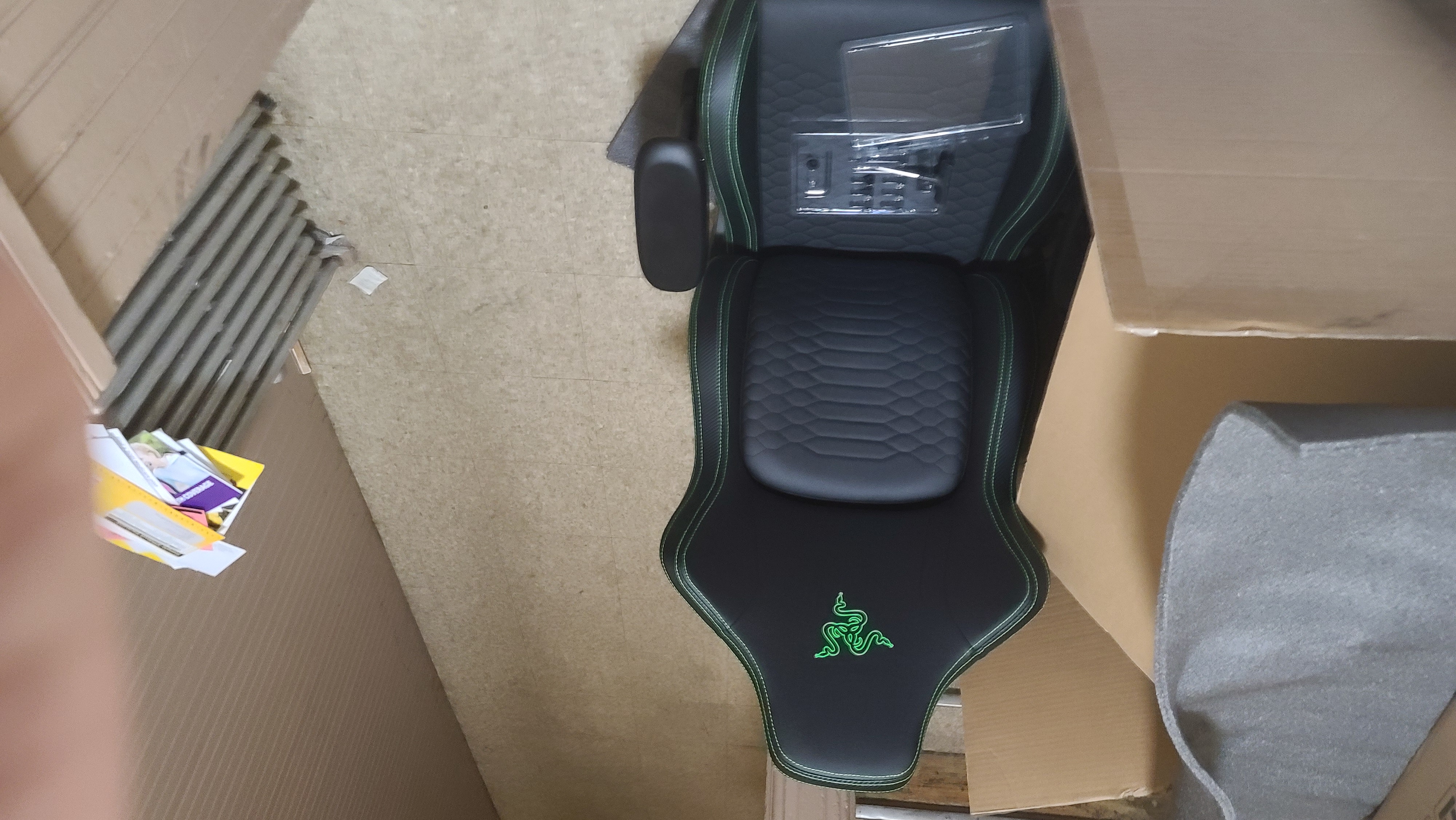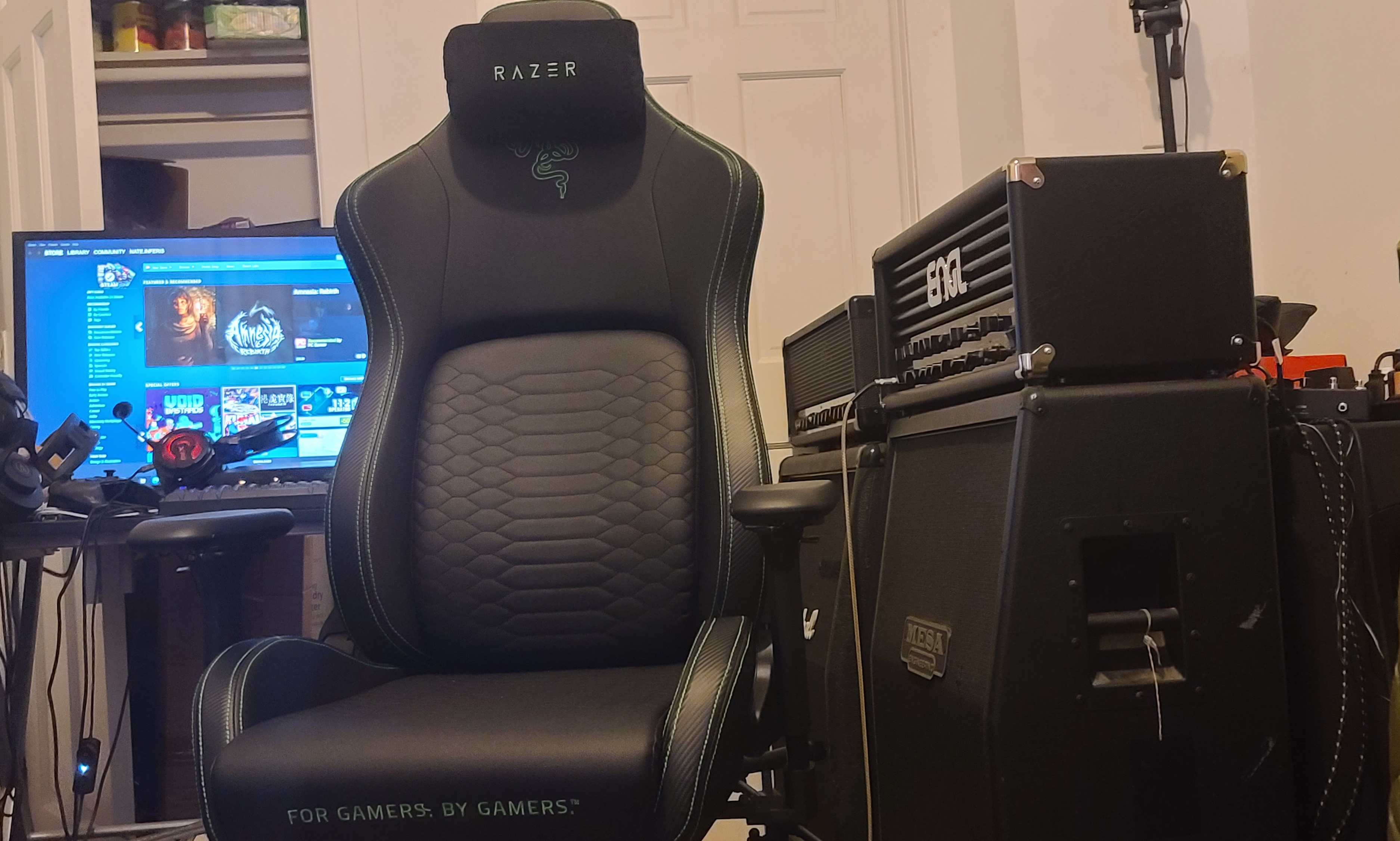Tom's Hardware Verdict
The Razer Iskur is an impressive first foray into gaming chairs by a peripheral industry stalwart. It has some interesting ideas but falls just short of perfect execution.
Pros
- +
Supportive, firm, comfortable padding
- +
Highly adjustable armrests
- +
Backrest is well-sculpted for support
- +
Versatile lumbar support
Cons
- -
Lumbar support mechanism is highly sensitive to screw tension
- -
Backrest lever can be stiff
- -
Levers can be difficult to reach for shorter gamers
- -
Not ideal for gamers with a wider frame
Why you can trust Tom's Hardware
Editor's note: This review was originally published on February 3, 2021.
Featuring firm, but comfortable, padding, an attractive design and an innovative, adjustable lumbar support system, the Razer Iskur ($500 MSRP) is well-suited for long gaming sessions. This throne doesn’t mind if you want to lean backward or even forward, and it will bend to your will to support your arms.
There are some small issues in terms of accessing the Iskur’s controls, and its dimensions make it less than ideal for girthier gamers. But this is a compelling first entry into the gaming furniture space from Razer and valiant effort to win the title of Best Gaming Chair.
Razer Iskur Specs
| Upholstery | PVC faux leather |
| Recline | 139 degrees |
| Total Height (with base) | 53 inches (134.62cm) |
| Backrest Height | 32 inches (82.55cm) |
| Backrest Width (shoulder level) | 19 inches (48.26cm) |
| Seating Area Width (total) | 21 inches (53.34cm) |
| Seating Area Width (point of contact) | 17 inches (43.18cm) |
| Recommended User Height | 5'6"-6'2" / 170-190cm |
| Recommended Weight | <299 pounds (108.4cm) |
| Weight | 66.8 pounds (30.30kg) |
| Warranty | 3 years |
Design of Razer Iskur
The Razer Iskur is a looming, imposing beast of a gaming chair. Our review unit proudly carries the classic black and green color scheme that has been Razer’s signature since its inception. The green Razer logo and stitching produce a slightly luminescent-like effect against the deep black of the PVC faux leather. This whole effect looks particularly cool in lower light settings.
The Iskur is very solidly built, with a sturdy metal and plywood frame and beefy caster wheels. The overall look screams premium, giving the appearance of a throne with its recessed back and tall headrest. There are call-outs to the Iskur’s gaming clout present in the design. The lumbar support cushion has a snake scale pattern that, while subtle, is very on-brand with Razer’s serpentine signature. And the front of the seat base sports the “For Gamers By Gamers” tagline in Razer green. The neck pillow has a soft fabric cover over memory foam and prominently features the Razer logo.
While the design of the Iskur isn’t too much of a departure from many other gaming chairs on the market, it does stand out from the pack by opting for simplicity over flash. From a distance, the more overtly gamer-oriented design flourishes, such as the scale pattern on the lumbar support cushion, are nearly invisible. You won’t find nods to racecars here, nor will you find the aggressively angular look prevalent in a lot of gaming furniture. The message here is clear: the Iskur, while designed for leisure activity, is not a toy.
That’s not to say that the Iskur would look at home in a conservative office setting. But its more elegant appearance does make it a better visual match for most setups. (Consider the starkly purple Cooler Master Caliber R2 for comparison). This reviewer is thankful Razer didn’t opt for RGB lighting – in this case, less is more.
Get Tom's Hardware's best news and in-depth reviews, straight to your inbox.
Update 3/5/2021: This week, Razer released an all-black version of the Iskur for the same price, offering a more muted styling option.
Lumbar Support of Razer Iskur
Many gaming chairs opt for pillows for lumbar support, but the Iskur takes a different path. A novel addition to the Razer Iskur that sets it apart from other gaming chairs is its adjustable lumbar support. This comes via a padded area of the backrest that can be adjusted to fit your form.
The lumbar cushioning covers from the base to the middle of the spine and is adjustable via a lever on the right side of the seat. You can opt for lumbar support that’s flush to the body of the chair, which I found handy for leaning back, or extended at an angle, which I preferred for leaning forward.
This is a very useful innovation that ensures comfort no matter how you prefer to sit in your chair. But there’s one small issue to take into account. The mechanism that controls the lumbar support system is very sensitive, and care must be taken when assembling the Iskur to make sure the screw on the valve isn’t too tight. If the valve is too tight, the lumbar mechanism may work poorly or not at all. I experienced this issue shortly after my initial assembly of the Iskur, and I’m not the only one. Thankfully, it was an easy fix. Loosening the offending screw had me up and running.
While I found the adjustability of the lumbar cushioning to be very helpful, especially for those times when leaning forward in my chair was called for, it would be nice if the lever itself was more accessible.
As it stands, the lever requires significant reach, making on-the-fly adjustments to the lumbar support system a potential game of Twister for shorter people with shorter arms. This isn’t a huge problem but it is worth noting when discussing a chair that is presented with ergonomics at the forefront of its design philosophy. Hopefully, this will be improved in future iterations of the Iskur.
Comfort and Adjustments on Razer Iskur
The Iskur has a very firm feel to it and is designed to promote better posture over long gaming sessions. This is something to keep in mind if you prefer a gaming chair with more give to its cushioning. But the Iskur provides solid support without feeling stiff. This is a chair that conforms to your body, as opposed to feeling like a couch cushion.
The faux leather material has a textured feel to it, and the main body fabric is slightly rougher to the touch than the lumbar support cushion’s fabric. Razer’s neck pillow is covered in a soft fabric that compliments the memory foam material well. There's just the right amount of give to conform to the neck and provide support.
The backrest is on the tall side, and the included memory foam neck cushion clasps to the top. The Iskur’s recommended maximum height is 6’2”, but I’m 6’4” and still found it to be very comfortable. The neck cushion was in a perfect position for me when I leaned back in the chair. Users shorter than the recommended height may want to consider foregoing the neck cushion altogether, however, as it likely won’t fit as snugly, and the top of the chair’s headrest is too small to make major position adjustments.
The Iskur’s armrests are comfortably firm without being unpleasantly hard. You can adjust them by using three buttons at the front and either side of each armrest. Depressing the front button allows you to adjust the angle of the armests about 45 degrees, the outside button allows for height adjustments of about 6 inches and the inside button lets you move the armrests about 3 inches left or right . You can also slide the armrests forward and back.
It’d be nice if the armrests could pull away further from your body though in order to accommodate wider frames. The Iskur has a fairly slim profile. You could remove the armrests to provide more room, but that’s far from an ideal solution. Hopefully, future iterations of the Iskur will take this into consideration.
Height, reclining angle and lumbar support can be quickly and easily adjusted via the three levers located near the armrests on the right and left sides of the chair. Operation of these levers was smooth with the exception of the recliner lever, which was hard to move and occasionally required a more authoritative tug than I would have liked.
Note that the levers controlling lumbar support and height adjustment are placed at an angle from the armrests and slightly underneath the seat. While this won’t present a problem for gamers with long arms such as myself, if you don’t have the reach to cover the distance, making these adjustments can be a tad uncomfortable.
Assembly of Razer Iskur
The Razer Iskur is relatively easy to assemble, eating up a scant 50 minutes of my time to put together. Included in the packaging are two Allen keys, a set of bolts of varying size and a large, poster-sized card with assembly instructions. There is also a scannable QR code on the instruction card that brings up a helpful assembly video.
While assembly itself was not overly complicated, the Iskur is quite a hefty chair, so the process can be a bit physically taxing for one person. This was especially apparent when screwing the sides onto the chair. The chair’s bulky frame is heavy, making it hard to reach the best angles for attaching the sides easily. I felt like I was in a bit of a fight to make sure I lined the pieces up correctly.
On the other hand, the casters pop easily into the base with a satisfying click. However, the base can be a little unwieldy to attach to the chair’s main body.
Bottom Line
The Razer Iskur is an excellent option for gamers looking for long-term comfort for those marathon sessions. It’s easy to assemble, well built, thoughtfully designed, attractive and suitable for work and play.
With an adjustable backrest offering various levels of lumbar support, you can get ample lower back support no matter how you prefer to sit. But this mechanism is extremely sensitive to screw tension, so extra care must be taken when assembling the unit. It would also be helpful if the lever for adjusting the lumbar support cushion was more easily accessible for smaller folks.
Razer has come out swinging with it’s first gaming chair, and while it is certainly not a universal solution for all gamers (those with wider body types will want to consider other options, like the Secretlab Titan XL), we can say with confidence that the Iskur justifies its premium price point with superior comfort, build quality and a nifty approach to lumbar comfort.

Nate Rand is a freelance reviewer for Tom's Hardware US, covering gaming headsets, keyboards, mice, and microphones.



